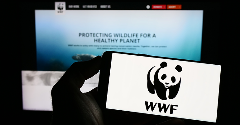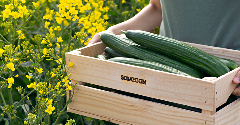News
Access in the spotlight this World Hunger Day
21 May 2021The Hunger Project has made huge progress in reducing global hunger, but Covid-19 has worsened poverty and limited food availability in many communities. This World Hunger Day, the focus is on access – to food, but also to essential resources like education, technology and healthcare.
Ten years ago, The Hunger Project created World Hunger Day to help raise awareness of the hundreds of millions of people without enough food to eat. The organisation chooses a different theme each year, and “Access Ends Hunger” marks the event’s tenth anniversary on May 28.
.png)
Evelijne Bruning, Director of The Hunger Project Netherlands, said lack of access had affected people in many different ways during the pandemic. For instance, usually almost 95% of Indian children attend school every day, but most have not had access to online classes while schools have been closed this past year. Lack of access to vaccines in Burkina Faso, to oxygen in India, or even to quality healthcare in Uganda are also of major concern.
“This inequality in access to education, healthcare and technology already existed before the corona crisis, but is now growing every day in the countries where we work,” she said.
According to UN figures, the proportion of undernourished people in the world declined from 15% in 2000-2004 to 8.9% in 2019, but the Covid-19 pandemic has been a major setback, pushing around 130 million more people into severe hunger.
Choosing optimism
The Hunger Project takes a community-based approach to tackling the causes of hunger and poverty, and although the coronavirus crisis has cast into doubt the UN’s Sustainable Development Goal of ending world hunger by 2030, Bruning remains optimistic.
“I have a firm belief in human creativity and perseverance,” she said. “For example, look at the more than 500,000 volunteers trained by The Hunger Project: they move mountains every day in their own village. Especially in times of crisis, people do the seemingly impossible. Because they know what their vision is, and they remain fully committed to everything that is possible. But that doesn't happen by itself – we have to keep investing in it."
Resources that make a difference
Manda Lakhami, trustee at The Hunger Project UK, also said there was reason to be positive.
She said that in many wealthier countries, we have the research and technologies needed to make a real difference to how people farm and feed themselves, and sharing those intellectual resources could help bring people out of poverty and hunger.
“For me it’s about keeping positive about how things can be done really easily and simply if organisations can think things through and go to the grassroots levels,” she said. “The Hunger Project has made some incredible sustainable impacts.”
For example, the Hunger Project has played a key role in creating 54 self-reliant epicentres. In these working areas hunger and poverty have significantly reduced. Self-reliant means community members are confident and have the capacity and skills to act as agents of their own development, and they have the skills and knowledge to work on working towards zero hunger and poverty in the future.
Beyond hunger
Rather than going into an area with ready-made solutions, the approach is to work with local communities to help tailor long-term, sustainable strategies.
“Once they have lifted themselves out of hunger, the impact is actually much broader, impacting water, sanitation, education, all different areas of people’s’ lives,” she said. “They have now got schools, better roads, electricity – it’s all interlinked.”
She added that many people in wealthier countries think of hunger as an issue requiring crisis management, but most of the world’s chronically hungry people are undergoing abject poverty and malnutrition rather than starvation.
“There’s many different issues and so many different layers,” she said. “What we do as an organisation is approach not just individual countries but individual regions to work out what is the biggest need. Everyone on this planet should have the access, but there is a disparity across the globe. So many different parties have to open the door.”
The Hunger Project is the Charity Partner of Fi Global.
Related news

Soy story: WWF scores UK supermarkets on sustainability efforts
12 Nov 2025
WWF has published its latest “Soy Scorecard”, ranking UK supermarkets’ efforts to combat deforestation and land conversion in their soy supply chains.
Read more
Standing Ovation and Bel scale up casein production from dairy co-products
11 Nov 2025
Foodtech company Standing Ovation has partnered with cheese specialist Bel Group to manufacture dairy serums for industrial-scale casein production via precision fermentation.
Read more
New UPF standard hoped to offer consumers ‘coherence and clarity’
10 Nov 2025
Ingredients companies are being urged to enter “a new era of partnership and innovation” following the launch of the industry’s first non-UPF verification scheme.
Read more
Whistleblowers accuse UK meat industry of promoting cheap, unsustainable supply
7 Nov 2025
An anonymous group of industry insiders has accused the UK’s biggest food companies of systematically driving down meat quality and welfare standards.
Read more
Bord Bia presents Irish dairy ingredient suppliers at Fi Europe
6 Nov 2025
Dairygold Co-operative Society, The Carbery Group, and Ornua Co-operative: Meet with sustainable producers of Irish dairy ingredients at Food ingredients Europe 2025, Hall 7.2 Stand M18.
Read more
AI attraction means foodtech startups must ‘prove’ rather than ‘promise’
4 Nov 2025
Reports suggest that artificial intelligence (AI) is sucking investment from foodtech and agritech, but investors say the picture is complicated.
Read more
Penguin and Club bars no longer classed as chocolate
30 Oct 2025
Penguin and Club bars can no longer be classified as chocolate after the pladis-owned McVitie’s brands turned to cheaper alternatives amid the ongoing cocoa crisis.
Read more
Could plant-based protection replace plastic packaging?
29 Oct 2025
Swedish foodtech company Saveggy has launched an additive-free plant-based protection for cucumbers, offering a waste-free packaging solution for fruit and vegetables.
Read more
Does promoting protein content push up plant-based sales?
27 Oct 2025
Promoting the protein content of meat-free products is a more effective sales strategy than adding carbon labels, a study of UK bakery chain Greggs suggests.
Read more
Amazon Grocery launch aims to balance quality with affordability
22 Oct 2025
Global e-commerce giant Amazon has introduced a new private-label food brand, combining existing Amazon Fresh and Happy Belly products with new everyday items.
Read more